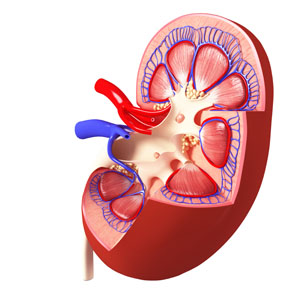Lithium Has Minimal Effects On Renal Function: Results Of Two New Large Controlled Studies
 Earlier this year we described a 2015 study by Harald Aiff and colleagues that suggested that long-term lithium use was associated with a risk of kidney failure. That study, published in the Journal of Psychopharmacology, included 630 patients who had taken lithium for at least 10 years. One-third of these patients had evidence of kidney dysfunction, and in 5%, the impairment was severe. Two new studies provide some data that suggest these risks may not be lithium-specific and are comparable to risks that come with taking other medications.
Earlier this year we described a 2015 study by Harald Aiff and colleagues that suggested that long-term lithium use was associated with a risk of kidney failure. That study, published in the Journal of Psychopharmacology, included 630 patients who had taken lithium for at least 10 years. One-third of these patients had evidence of kidney dysfunction, and in 5%, the impairment was severe. Two new studies provide some data that suggest these risks may not be lithium-specific and are comparable to risks that come with taking other medications.
The first, by Stefan Clos et al. in The Lancet Psychiatry, included 1,120 patients followed for up to 12 years. On average, these patients had been exposed to lithium for a little over 4.5 years. Clos and colleagues determined patients’ estimated glomerular filtration rate (eGFR), a measure of how well the blood is filtered by the kidneys. The researchers concluded that there was “no effect of stable lithium maintenance therapy on the rate of change of eGFR over time” compared to other drugs such as quetiapine, olanzapine, or valproate.
The second new study, by Lars Vedel Kessing and colleagues in the journal JAMA Psychiatry, included 26,731 patients exposed to lithium and 420,959 exposed to anticonvulsants. Kessing and colleagues concluded that both exposure to lithium and exposure to an anticonvulsant were associated with an increased rate of chronic kidney disease, but lithium was not associated with end-stage kidney disease (the kind that requires dialysis or renal transplantation).
The three studies taken together suggest the following: Taking lithium for an average of 4–5 years does not affect kidney functioning, and longer exposure may not harm kidney function any more than other medications (such as anticonvulsants) would. However, kidney functioning (in terms of eGFR) does decline with age, and is also lower among those with higher baseline eGRF, those with other illnesses, those taking other drugs that affect the kidneys, and those who experience an episode of lithium toxicity.
Long-term use of lithium and anticonvulsants (but not antipsychotics or antidepressants) is associated with chronic kidney impairment. However, Kessing’s study shows that long-term lithium use (defined as 60 or more lithium prescriptions) is not associated with end-stage disease.
Editor’s Note: Kessing’s is the largest controlled study to date to indicate that lithium is not associated with end-stage kidney disease, and that decreases in kidney function seen with chronic lithium use also occur with exposure to anticonvulsants.
Given lithium’s exceptional record of efficacy and safety over the past 40 years, it may be under-prescribed in the US compared to many European countries, and this may have adverse consequences for the long-term course of bipolar disorder. Lithium has many advantages over other medications.
Lithium:
- Reduces mania and depression better than valproate (according to recent comparisons)
- Reduces suicide risk
- Protects neurons in animals
- Increases proteins that protect neurons (like BDNF and BCL2) and decreases cell death factors (like BAX and P53)
- Increases hippocampal and cortical volume in humans
- May slow the progression of mild cognitive impairment
- May reduce the rate of dementia in old age
Can be used to treat mania in young people (aged 7 to 17; according to new research by Robert Findling et al. in the journal Pediatrics)
Given the new data on lithium’s long-term effects on kidney function compared to comparable drugs, the case for long-term use of lithium (either alone or in combination with other agents) to prevent both manic and depressive episodes is even stronger.

